World News
More sick children go private

By Jane Deith and Alys Harte, BBC File on 4
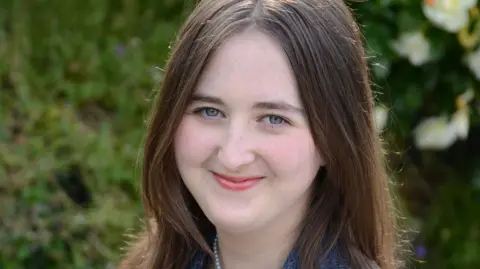 Alex Smith
Alex SmithThe number of children receiving treatment in private hospitals across the UK rose by almost a quarter last year to more than 46,000, according to new data seen by the BBC.
In each case, families either paid for treatment or used medical insurance – rather than being referred by the NHS.
The record figures from private healthcare providers come as England’s NHS trusts tell File on 4 that children have become the “forgotten generation” in the race to reduce health service backlogs.
The Department of Health says NHS staff are “working tirelessly” to cut waiting lists.
But the Royal College of Surgeons in England told us children were lagging behind adults and spending years waiting for NHS surgery – with potentially life-long consequences for their health and development.
NHS Providers, which represents trusts, says some hospitals can find it easier to do large numbers of adult operations because they are often simpler and quicker to perform.
‘A cloud over my head’
The BBC has spoken to a number of families whose children’s conditions have deteriorated during long waits.
They include 16-year-old Georgina Smith from Hertfordshire, who is waiting for open-heart surgery to repair a valve on her right side which doesn’t close properly. It can cause her blood to flow the wrong way, making it harder for her heart to work.
Georgina is one of 601 children waiting for heart surgery in England – 139 have been waiting more than six months.
She suffers chest pains, extreme fatigue and fainting episodes and has been forced to miss a lot of school.
Ten years ago, Georgina’s parents were told she needed surgery immediately. But then doctors at Great Ormond Street Hospital for Children said it would be better to wait until her heart was fully grown.
However, last year an ultrasound showed Georgina’s heart was getting weaker. Doctors said she should have surgery within six months. But Georgina has been on the waiting list for nine months.
Georgina says she feels like her operation will never happen. “It’s like a cloud over my head, it’s always just this waiting and waiting and waiting,” she says.
In a statement, Great Ormond Street Hospital told the BBC: “While we have reduced our cardiac surgery waiting list by 25% since the pandemic, there are many challenges we continue to face”. It added this included demand for beds, often from emergency patients.
After the BBC approached the hospital for a statement, Georgina received a date for surgery in July.

Jane Deith investigates children waiting years for surgery on the NHS
Listen on BBC Sounds now. It will also be on Radio 4 at 20:00 on Tuesday 18 June and 11:00 on Wednesday 19 June.

Data released under a Freedom of Information request reveals the number of children facing very long waits to be admitted to hospital across the UK.
It shows at least 20,000 waits of more than a year for treatment including surgery.
Most of these long waits are in England – approaching 16,000 at the start of this month, up 15% in a year.
Before the pandemic, it was extremely rare for children to wait more than a year for surgery.
Trusts in England say children must be explicitly prioritised by the government, including more funding to allow trusts to commission more surgery.
NHS England, which runs the health service in England, said it recognised it could be distressing for families who were waiting for a child to have surgery. It said it was increasing the number of ring-fenced beds for paediatric surgery, in addition to critical care beds.
The Department of Health added that NHS England had set up a task force specifically aimed at bringing down waiting times for children’s surgery.
In Wales, the Department of Health told us it was putting more money into the NHS and prioritising reducing long waits for children.
Scotland’s Department of Health said it was maximising productivity and targeting extra resources at driving down waiting times for children – particularly the longest waits.
Overall, across the UK, the number of children being seen privately since 2019, before the pandemic, is up 38%.
The figures, from the Private Healthcare Information Network, do not include NHS trusts using private hospitals to provide treatment.
They show the number of children having surgery privately rose almost a fifth last year to over 24,000.
Children aged 15 to 17 are the biggest patient group for surgery. The most common procedures are the insertion of grommets in the ears, removal of tonsils and adenoids, and orthopaedic surgery.
‘Coming to harm’
In Northern Ireland, the Royal College of Surgeons has described the waits for children’s surgery as “dire”.
Niall McGonigle, a thoracic surgeon in Belfast, says thousands of children have been waiting four or five years. He says he has sent out “an SOS” to the Northern Ireland Assembly over the severe backlog.
“Children are suffering. We can no longer sit by and allow this to happen because we do know that patients are coming to harm,” the surgeon told the BBC.
“What may have been a relatively straightforward operation turns into a more complex operation which is more difficult for the surgeon, but more importantly, more difficult for the child.”
In extreme cases, very long delays in surgery risk leaving a child inoperable.
Six-year-old Jack Dorrity, from Ballymena, has cerebral palsy and has been waiting for a hip operation since he was three.
Back then, surgeons at the Royal Belfast Hospital for Sick Children said Jack needed an operation immediately on both his hips, to stop his muscles pulling them out of their sockets.
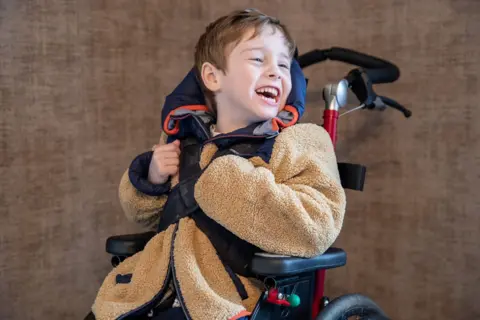 Aodhan Roberts/Belfast Telegraph
Aodhan Roberts/Belfast TelegraphBut he has been stuck on the waiting list so long that one hip has now dislocated and is growing up towards his waist. Jack’s father, Leon, says the longer his son waits, the more he’s suffering.
“Any time we put our arms under his legs to lift him out of his chair, he’s sore. He winces, he cries. He’s quite upset, so we know it’s causing him pain,” he says.
Because Jack’s hip has come out of its socket, performing surgery will be more difficult, and it would take too long to do both hips at the same time. So Jack now needs two, six-hour operations.
But the hospital has told Jack’s parents it can’t do a six-hour operation because it would mean cancelling too many other patients. Last year the trust cancelled 566 children’s procedures.
Leon has been warned if Jack waits much longer for surgery, it may not be possible to put his hip back in. Instead, surgeons may have to cut off the top of his leg bone completely. Jack would be left more disabled and unable to bear weight on his leg.
“He’s going to have a floppy leg and his hips will be unbalanced, which can lead to scoliosis. But if we missed the hip surgery, are we going to miss the scoliosis surgery?
“I get angry for Jack. They’re failing children and it’s the children with the greatest needs that are being failed.”
Belfast Health and Social Care Trust said in a statement it was under increased and sustained pressure and was very sorry it has not been able to give Jack his surgery. It said it was exploring all possible options to help him.
Northern Ireland’s Department of Health told us it was trying to maximise the existing capacity in paediatric surgery, but it could not add any more capacity with the funding it received in the budget.
World News
Holly Jackson: ‘Obviously, I love murder

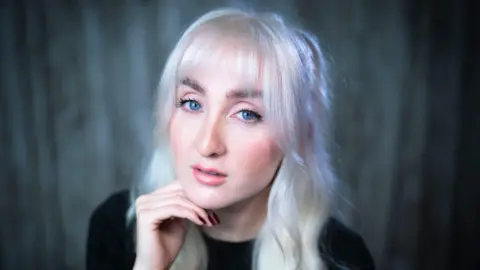 Holly Jackson
Holly JacksonBestselling author Holly Jackson shares her secrets for plotting a modern murder mystery – and explains how true crime has influenced her.
For the author of A Good Girl’s Guide to Murder, the process of writing a whodunnit is as meticulous as investigating a crime.
“I am obsessive about it,” she says. “I don’t quite have a ‘murder board’ because it’s not on the wall, but it is on the floor.”
Each scene in one of Holly’s books corresponds to an index card, which is then carefully placed into columns for each act in the story. The author admits this “does rather take over the room”.
While this is great for planning a storyline, Holly says opening her office door a “bit too ferociously” can literally blow her plot out of place.
A Good Girl’s Guide to Murder follows plucky heroine Pip Fitz-Amobi as she investigates a closed murder case. Pip soon finds a co-detective in Ravi Singh, whose brother was implicated in the crime.
Each clue, twist and turn in the story has been thoroughly discussed by Holly’s fans on TikTok; the hashtag for A Good Girl’s Guide to Murder – #agggtm – has more than 58,000 posts.
And the story has now been turned into a BBC drama by lead writer Poppy Cogan, with Holly serving as executive producer.
The Guardian called the series a “very modern Nancy Drew,” with fans on TikTok praising the show, stitching their reactions with clips from the new series.
The BBC spoke to Holly about the process of writing her hit novel. “Obviously, I love murder,” she says, “fictional murder.”
‘I need true crime in my ears’
Holly, 31, from Buckinghamshire, published her debut in 2019. She won a British Book Award the following year and has sold millions of copies around the world.
While her fiction fits into the young adult category, Holly does not shy away from heavier topics, like crime. Her first novel, for example, follows the disappearance and apparent murder of a school girl.
And Holly says true crime content – like the podcast Serial – became a “very useful” tool when writing A Good Girl’s Guide to Murder. The structure of the book feels like a podcast, Holly says, adding: “We have transcripts of dialogue the whole time.”
In the sequel to Holly’s first book – called Good Girl, Bad Blood – Pip even creates a true crime podcast herself.
And Holly says this research tool soon seeped into her real-life. “I can’t really do anything without a true crime podcast,” she says. “If I’m walking the dog or washing the dishes, I need true crime in my ears.”
Allow TikTok content?
In the last ten years, true crime series have won international acclaim: Serial won a Peabody Award in 2015 and In The Dark – a long-form investigative journalism series – became the first podcast to win a George Polk Award in 2019. And, according to The New York Times, Serial has had more 705m downloads.
Even Holly is curious why crime is such a popular source of entertainment.
“Especially with young women,” she wonders, “is that like, an instinct in us that’s trying to protect ourselves?”
Georgia Hardstark is the co-host of My Favorite Murder, a US podcast that looks into historic and modern cases, with one episode covering the Dancing Plague of 1518 and the Paper Bag Killer.
For Georgia, part of the reason she is so interested in true crime is that it helps her feel less “paranoid” and validates her anxieties about life, she explains.
“That is at the forefront of my mind, constantly, you know, ‘What’s around the next corner? Are my doors locked?'”
‘I know who the murderer is’
For Holly, the line between fact and fiction is clearly drawn: unlike true crime cases, she always knows “the ending before I even write the first sentence”.
“I knew from the get-go who the murderer was going to be, this whole setup,” she says. “The slightly more complicated thing is not working out the mystery – it’s working out how Pip is going to solve the mystery.”
In A Good Girl’s Guide to Murder, for example, Pip uses her Extended Project Qualification – an accreditation where a student independently researches a given topic – to interview suspects and keep track of clues for the case.
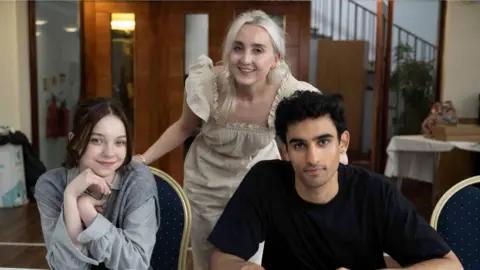 BBC/Moonage/Sally Mais
BBC/Moonage/Sally MaisWhile Holly uses true crime as a “jumping off” point for research, she notes the content, often used as a source of entertainment, is “obviously, about real life people’s trauma”.
Jessica Jarlvi – a “Scandi-noir” writer and lecturer on the University of Cambridge’s Crime and Thriller Writing course – says things like true crime podcasts risk sensationalising these events.
“It just puts me off,” she says, “whereas in fiction, you don’t have to worry about that.”
In Georgia’s view, however, ignoring real-life crime – often with women victims – “is to sweep it under the rug”.
‘I don’t have passive readers’
Modern crime readers are “becoming more and more demanding”, Jessica adds.
Holly agrees: “I don’t have those passive readers, I have the really active ones who are looking to solve the mystery.”
On TikTok, fans of A Good Girl’s Guide to Murder share videos with their predictions and suspect lists as they read along with the book.
In one video, a reader guides people on how to annotate the book to keep track, colour co-ordinating sections into “clues” and “conflicts”.
“It makes me have to up my game a bit more,” Holly says.
Wondering how to watch A Good Girl’s Guide to Murder? You can stream the series on BBC iPlayer.
World News
For sale: A piece of California’s country music history
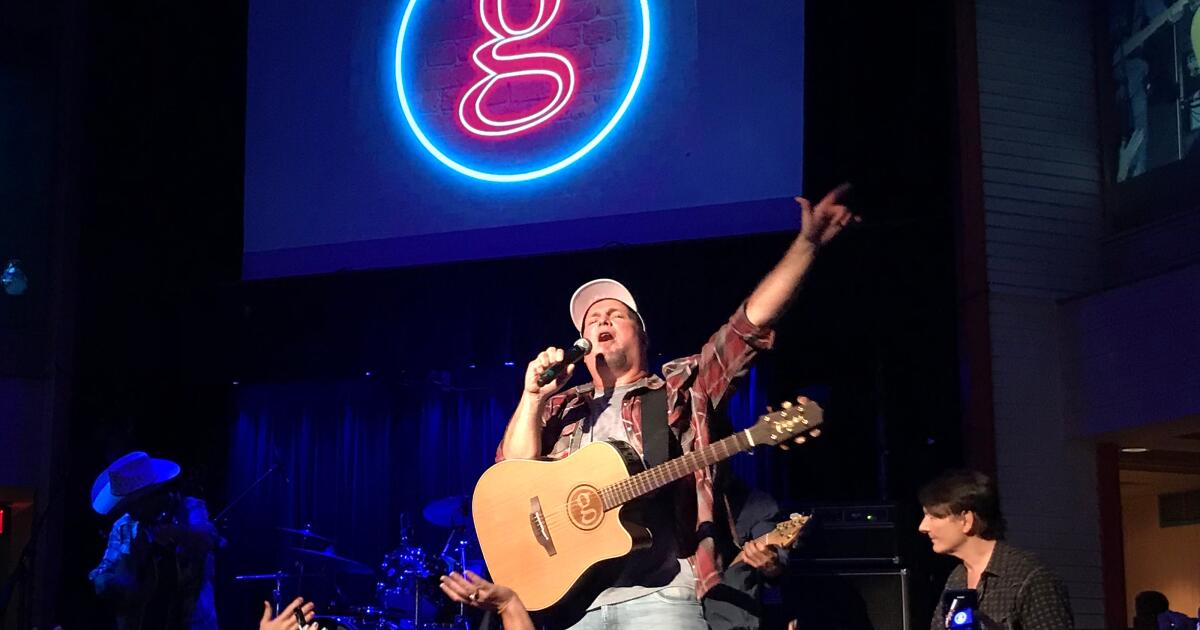

The famed Buck Owens Crystal Palace, where music legends including Willie Nelson, Dwight Yoakam, Garth Brooks and a young Taylor Swift have played, is up for sale, with the foundation that runs the Bakersfield venue planning to list it for $7 million on Monday.
The nightclub, museum and steakhouse was owned by its namesake Buck Owens, the country music trailblazer who bucked the slick commercial melodies of Nashville for a distinctly West Coast twang. Owens opened the Crystal Palace in 1996, watching it become a premier venue for the biggest names in country music, including himself. Buck and the Buckaroos played there every Friday and Saturday night until his death in 2006.
Jim Shaw, a member of the Buckaroos and a director of the Buck Owens Private Foundation, said that after 28 years of running the famed venue, the Owens family plans to step back and find new owners amid a challenging business climate. The foundation said in a statement that “since Buck’s passing in 2006, we’ve tried to maintain the excellence that he expected, even as it became more and more difficult during these challenging times of increasing food and labor costs.”
The venue is not closing and scheduled events will continue as planned, Shaw said.
“It’s business as usual for now,” Shaw said. “Ideally, someone who wants to keep it exactly as it is will come forward.”
Owens’ youngest son, Johnny Owens, wrote on Facebook that the family’s hope “is that a buyer steps forward with a vision for the future and a reverence” for his father and the Bakersfield Sound.
The Crystal Palace, located on Buck Owens Boulevard, is a major tourism staple for Bakersfield. The 18,000-square-foot venue is next to the city’s downtown entrance.
“It’s the No. 1 tourist attraction in Bakersfield,” Shaw said. “There are people stepping forward and we are waiting to see what happens. I am getting a lot of phone calls. I’m anxious to see what happens.”
World News
2nd local radio host says they were given questions ahead of Biden interview

A second local radio host on Saturday told ABC News that he was provided a list of questions in advance of his interview with President Joe Biden this week.
“Yes, I was given some questions for Biden,” Earl Ingram of CivicMedia told ABC News. Ingram, a prominent host of a Wisconsin radio station, interviewed Biden this week in the wake of his debate performance.
Ingram said he was given five questions and ended up asking four of them.
“I didn’t get a chance to ask him all the things I wanted to ask,” he said.
Ingram is the second interviewer who now says they were provided questions by Biden aides to ask the president this week. Earlier today, another local radio host who interviewed Biden this week told CNN she was given questions to ask Biden before the interview.
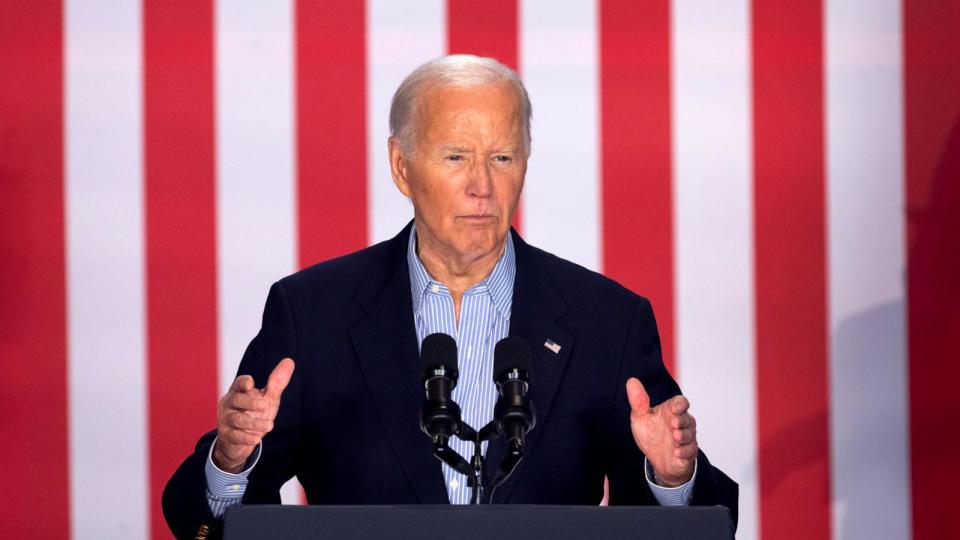

“We do not condition interviews on acceptance of these questions, and hosts are always free to ask the questions they think will best inform their listeners,” the Biden campaign told ABC News on Saturday.
Ingram told ABC he didn’t see anything necessarily wrong with the practice. “To think that I was gonna get an opportunity to ask any question to the President of the United States, I think, is a bit more than anybody should expect,” he said.
He continued that he was grateful for the opportunity to interview Biden at all.
“Certainly the fact that they gave me this opportunity … meant a lot to me,” Ingram said.
MORE: Wealthy Democratic donors sound alarm over Biden staying in race
On CNN earlier today, Andrea Lawful-Sanders, the host of WURD’s “The Source,” said Biden officials provided her with a list of eight questions ahead of their interview with Biden.
“The questions were sent to me for approval; I approved of them,” she said.
“I got several questions — eight of them,” she continued. “And the four that were chosen were the ones that I approved.”
Responding to Lawful-Sanders, Biden campaign spokesperson Lauren Hitt said in a statement that it’s not “uncommon” for interviewees to share topics they would prefer. She noted that Lawful-Sanders was “free” to ask any questions she saw fit. She also noted that it was the campaign who sent over the questions and not the White House as other reports claim.
Lawful-Sanders did note in her interview with CNN that she ultimately “approved” the questions provided.
“It’s not at all an uncommon practice for interviewees to share topics they would prefer. These questions were relevant to news of the day – the president was asked about this debate performance as well as what he’d delivered for black Americans,” the statement said.
“We do not condition interviews on acceptance of these questions, and hosts are always free to ask the questions they think will best inform their listeners. In addition to these interviews, the President also participated in a press gaggle yesterday as well as an interview with ABC. Americans have had several opportunities to see him unscripted since the debate.”
A source familiar with the Biden booking operation told ABC News that moving forward they will “refrain” from offering suggested questions to interviewers.
“While interview hosts have always been free to ask whatever questions they please, moving forward we will refrain from offering suggested questions.”
2nd local radio host says they were given questions ahead of Biden interview originally appeared on abcnews.go.com
-

 African History5 years ago
African History5 years agoA Closer Look: Afro-Mexicans 🇲🇽
-

 African History5 months ago
African History5 months agoBlack History Facts I had to Learn on My Own pt.6 📜
-

 African History5 years ago
African History5 years agoA Closer Look: Afro-Mexicans 🇲🇽
-

 African History1 year ago
African History1 year agoMajor African Tribes taken away during the Atlantic Slave Trade🌍 #slavetrade #africanamericanhistory
-

 African History1 year ago
African History1 year agoCameroon 🇨🇲 World Cup History (1962-2022) #football #realmadrid #shorts
-

 African History5 months ago
African History5 months agoBlack History Inventors: Mary Kenner 🩸
-

 African History1 year ago
African History1 year agoPROOF AFRICAN AMERICANS AIN'T FROM AFRICA DOCUMENTED EVIDENCE
-

 African History1 year ago
African History1 year agoNo African pre-Columbus DNA? 🤯🤯 #history #mesoamerica #mexico #african























